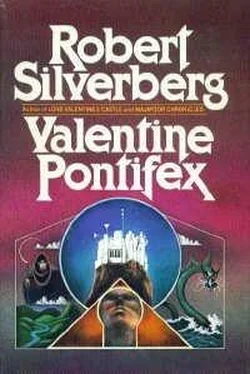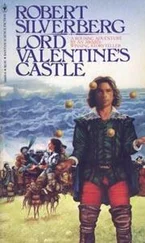The Danipiur was cool, remote, proper. Faraataa felt the merest flicker of awe—she had held her office during the entire span of his life, after all—but quickly he mastered it. Her lofty style, her supreme self-possession, were, he knew, mere weapons of defense.
She offered him a meal of calimbots and ghumba, and to drink gave him a pale lavender wine, which he eyed with displeasure, wine not being a beverage that had been used among the Piurivars in the ancient times. He would not drink it or even raise it in a salute, which did not pass unnoticed.
When the formalities were done the Danipiur said brusquely to him, “I love the Unchanging Ones no more than you do, Faraataa. But what you seek is unattainable.”
“And what is it that I seek, then?”
“To rid the world of them.”
“You think this is unattainable?” he said, a tone of delicate curiosity in his voice. “Why is that?”
“There are twenty billion of them. Where are they to go?”…
“Are there no other worlds in the universe? They came from them: let them return.”
She touched her fingertips to her chin: a negative gesture carrying with it amusement and disdain for his words. Faraataa refused to let it irritate him.
“When they came,” said the Danipiur, “they were very few. Now they are many, and there is little travel in these times between Majipoor and other worlds. Do you understand how long it would take to transport twenty billion people from this planet? If a ship departed every hour carrying ten thousand of them, I think we would never be rid of them all, for they must breed faster than the ships could be loaded.”
“Then let them stay here, and we will continue to wage war against them. And they will kill one another for food, and after a time there will be no food and the ones who remain will starve to death, and their cities will become ghost places. And we will be done with them forever.”
Again the fingertips to the chin. “Twenty billion dead bodies? Faraataa, Faraataa, be sensible! Can you comprehend what that means? There are many more people in Ni-moya alone than in all of Piurifayne—and how many other cities are there? Think of the stench of all those bodies! Think of the diseases of corruption let loose by so much rotting flesh!”
“It will be very sparse flesh, if they all have starved to death. There will not be so much to rot.”
“You speak too frivolously, Faraataa.”
“Do I? Well, then, I speak frivolously. In my frivolous way I have shattered an oppressor under whose heel we have writhed for fourteen thousand years. Frivolously I have hurled them into chaos. Frivolously I—”
“Faraataa!”
“I have achieved much in my frivolous way, Danipiur. Not only without any aid from you, but in fact with your direct opposition much of the time. And now—”
“Attend me, Faraataa! You have set loose mighty forces, yes, and you have shaken the Unchanging Ones in a way that I did not think possible. But the time has come now for you to pause and give some thought to the ultimate consequences of what you have done.”
“I have,” he replied. “We will regain our world.”
“Perhaps. But at what a cost! You have sent blights out into their lands—can those blights be so easily called back, do you think? You have devised monstrous and frightful new animals and turned them loose. And now you propose to let the world be choked by the decaying corpses of billions of people. Are you saving our world, Faraataa, or destroying it?”
“The blights will disappear when the crops they feed on, which are mainly not anything of any use to us, have perished. The new animals are few and the world is large, and the scientists assure me that they are unable to reproduce themselves, so we will be rid of them once their work is done. And I am less fearful of those decaying corpses than you. The scavenger birds will feed as they have never fed before, and we will build temples out of the mounds of bones that remain. Victory is ours, Danipiur. The world has been regained.”
“You are too confident. They have not yet begun to strike back at us—but what if they do, Faraataa, what if they do? I ask you to remember, Faraataa, what Lord Stiamot accomplished against us.”
“Lord Stiamot needed thirty years to complete his conquest.”
“Yes,” said the Danipiur, “but his armies were small. Now the Unchanging Ones outnumber us greatly.”
“And now we have the art of sending plagues and monsters against them, which we did not have in Lord Stiamot’s time. Their very numbers will work in their disfavor, once their food supplies run out. How can they fight us for thirty days, let alone thirty years, with famine pulling their civilization apart?”
“Hungry warriors may fight much more fiercely than plump ones.”
Faraataa laughed. “Warriors? What warriors? You speak absurdities, Danipiur. These people are soft.”
“In Lord Stiamot’s day—”
“Lord Stiamot’s day was eight thousand years ago. Life has been very easy for them ever since, and they have become a race of simpletons and cowards. And the biggest simpleton of all is this Lord Valentine of theirs, this holy fool, with his pious abhorrence of violence. What do we have to fear from such a king as that, who has no stomach for slaughter?”
“Agreed: we have nothing to fear from him. But we can use him, Faraataa. And that is what I mean to do.”
“In what way?”
“You know that it is his dream to come to terms with us.”
“I know,” said Faraataa, “that he entered Piurifayne foolishly hoping to negotiate with you in some way, and that you wisely avoided seeing him.”
“He came seeking friendship, yes. And yes, I avoided him. I needed to learn more about your intentions before I could enter into any dealings with him.”
“You know my intentions now.”
“I do. And I ask you to cease spreading these plagues, and to give me your support when I meet with the Coronal. Your actions threaten my purposes.”
“Which are?”
“Lord Valentine is different from the other Coronals I have known. As you say, he is a holy fool: a gentle man, with no stomach for slaughter. His loathing of warfare makes him pliant and manipulable. I mean to win from him such concessions as no previous Coronal would grant us. The right to settle once again in Alhanroel—possession once more of the sacred city Velalisier—a voice in the government—complete political equality, in short, within the framework of Majipoori life.”
“Better to destroy the framework entirely, and settle where we choose without asking leave of anyone!”
“But you must see that that is impossible. You can neither evict twenty billion people from this planet nor exterminate them. What we can do is to make peace with them. And in Valentine lies our opportunity for peace, Faraataa.”
“Peace! What a foul lying word that is! Peace! Oh, no, Danipiur, I want no peace. I am interested not in peace but in victory. And victory will be ours.”
“The victory you crave will be the doom of us all,” the Danipiur retorted.
“I think not. And I think your negotiations with the Coronal will lead you nowhere. If he grants such concessions as you mean to ask, his own princes and dukes will overthrow him and replace him with a more ruthless man, and then where will we be? No, Danipiur, I must continue my war until the Unchanging Ones have vanished entirely from our world. Anything short of that means our continued enslavement.”
“I forbid it.”
“Forbid?”
“I am the Danipiur!”
“So you are. But what is that? I am the King That Is, of whom the prophecies spoke. How can you forbid me anything? The Unchanging Ones themselves tremble before me. I will destroy them, Danipiur. And if you oppose me, I will destroy you as well.” He rose, and with a sweep of his hand he knocked aside his untouched wine-bowl, spilling its contents across the table. At the door he paused and looked back, and briefly allowed his shape to flicker into the form known as the River, a gesture of defiance and contempt. Then he resumed his own form. “The war will continue,” he said.
Читать дальше












